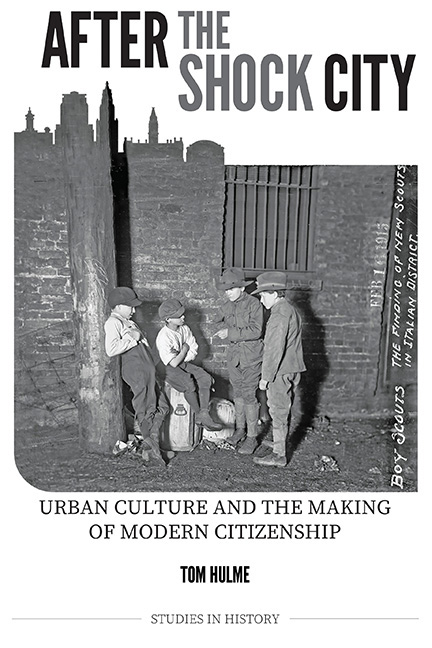Book contents
- Frontmatter
- Dedication
- Contents
- List of figures
- Acknowledgements
- Abbreviations
- Introduction: after the shock city
- 1 Citizenship and the Interwar City
- 2 Urban Utopias and Education
- 3 Celebrating the City
- 4 History, Progress and Community Performance
- 5 The Citizen of Tomorrow
- 6 Civic Culture and Welfare
- Conclusion: after the citizenship city
- Bibliography
- Index
2 - Urban Utopias and Education
Published online by Cambridge University Press: 03 September 2019
- Frontmatter
- Dedication
- Contents
- List of figures
- Acknowledgements
- Abbreviations
- Introduction: after the shock city
- 1 Citizenship and the Interwar City
- 2 Urban Utopias and Education
- 3 Celebrating the City
- 4 History, Progress and Community Performance
- 5 The Citizen of Tomorrow
- 6 Civic Culture and Welfare
- Conclusion: after the citizenship city
- Bibliography
- Index
Summary
Civics was a form of education that aimed to induct pupils into an imagined public, based on political engagement, civic responsibility and social belonging. Textbooks, lessons and study groups in the interwar period give the most explicit examples of how the idea of the city was used as an educational tool of citizenship promotion. In a variety of settings and publications, cities were portrayed as interlocking, responsible and responsive communities, whose inhabitants were loyal not just to the nation or the empire but to their neighbours and home town as well. Urban government, for its part, was romanticised as the benevolent father of the citizenry: the source of egalitarian social provision and forward-thinking leadership. Utilities and services managed by the government's (supposedly) non-political bureaucracy, such as gas and water or parks and libraries, were the benefits of belonging to the locality. Municipal government, civic educators insisted, allowed citizens to live the lives they deserved. Such rights, of course, came with a string of responsibilities: civic pride, good urban behaviour and democratic engagement. Widespread civic education was not a new phenomenon and the lessons taught had their basis in late nineteenth-century movements for improving working-class education. Questions about how to create citizenship had, after all, been circulating in the decades before the First World War. The local focus for civics textbooks, though, was more novel. As commentators across Britain and the US questioned how problems of racial or class conflict could be overcome, it was to ideas of urban belonging that they looked.
The flood of new textbooks, on both sides of the Atlantic, demonstrated the currency of the topic. In many cases these texts were not focused on any one place. When civic education discourse filtered down to the city, however, it was adapted to local government and culture. Textbooks for citizenship, as with textbooks in general, varied in style and complexity, depending on the audience that the author had in mind. All had the same central goal, though: to deliver an authoritative overview of an area of knowledge. There are difficulties in knowing exactly how textbooks were actually used, either by teachers constructing their lessons or by students in class.
- Type
- Chapter
- Information
- After the Shock CityUrban Culture and the Making of Modern Citizenship, pp. 47 - 70Publisher: Boydell & BrewerPrint publication year: 2019

